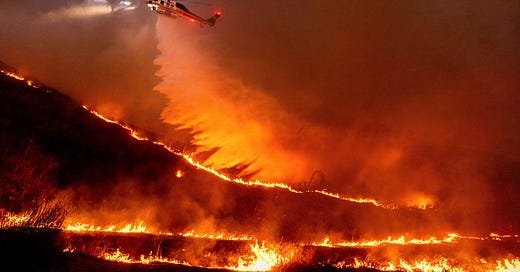POLI•RANT: One Tip Over the Line, Sweet Jesus
We've lost the Climate war and it's time to get real.
You don’t have to be a professional climate scientist or an avid environmentalist to know that we were always going to get here.
Even if — like me and millions of others — you didn’t fully grasp the Climate Change concept until Al Gore’s An Inconvenient Truth in 2006 — you knew this was coming.
No, not the fabled Tipping Point. It’s pretty well accepted that we blew through that point of going back to normal years ago.
I’m talking about that imaginary line where societies have to take big measures simply to survive.
It’s been happening across Africa for years. Climate created drought and famine are driving countless refugees to Europe — which is destabilizing almost every country there and helping to fuel right-wing authoritarian movements using that fear for their own gains.
It’s happening here too, and it’s impossible for any sane individual not to see it: Yearly “once in a century” flooding on the Mississippi and other major and minor rivers, hurricanes packing power that will soon merit another category to describe the destruction, unbearable heatwaves in the southwest, and of course the near-biblical level of wildfire destruction in and around Los Angeles.
Republicans writ large may want to continue to fuel near-comical lies, but, at this point it really doesn’t matter. We’re not going back. It’s time to admit that we’ve lost the Climate Change war. What the discussion (amongst the sane) should be now is making the occupation as livable and bearable as possible.
Just look at Florida.
Barely above sea level to begin with, if there’s a brief rain shower in Miami everything floods. Every. Time.
You damn near have to be a millionaire to afford home insurance in all of Florida — there are only a few insurance companies that even offer it. Near the coast?
Good luck.
Simply put, the free hand of the market is slowly but surely pushing civilization away from the coasts.
Even more than today, it’s going to be the exclusive territory of the 1%. But, even that will last for only so long. And as storms increase in strength, frequency, and unpredictability, that exclusion zone is only going to spread across the Gulf of Mexico and likely up the East Coast.
The same thing is happening in the Heartland.
Along the Mississippi and its tributaries, it’s nearly impossible to get insurance (or even build or rebuild) in what have now been designated flood zones.
And then there’s Southern California.
Before the recent devastating wild fires, scores of people had their home insurance cancelled or simply couldn’t afford it anymore. As much as it goes against our human desire to proclaim that “we’ll come back stronger” it’s hard to see how that happens anywhere near like before.
The Santa Anna winds are only going to get stronger and more erratic. Cut down all the brush and the fuel for fires and biblical mudslides replace them. There’s no good answer.
In the southwest where the population has exploded in recent decades it is, of course, the heat. Climate models show it going ever up. Like insurance elsewhere, energy costs are likely to rise to such a degree that it prices most people out of the market. Add water scarcity and large swaths of Arizona and Nevada will become unsustainable for the general population.
No one is going to make some definitive statement about these places in crisis, but it’s going to happen. Cost and then local, state, and federal laws will inevitably push us out of the most dangerous places to live. We’re going to have to accept that we simply can’t live on the beach, have a boat dock on the river behind the house, or overlook the Pacific Ocean.
That doesn’t mean we throw up our hands and double-down on fossil fuels. Far from it. The damage can be mitigated. And leaving the coasts and flood plains has its benefits. Letting more coastline go back to nature and helping to reestablish natural reef systems lessens the impact of killer hurricanes. River flood zones, left to their natural devices, brings in more alluvial soil that can help farmers.
And maybe there’s an even bigger benefit: A slight equalization in our uneven society.
More land left to nature, but more “public” beaches. Less mansions overlooking the ocean, but more state parks open to everybody.
And maybe, just maybe, we might learn that we’re all in this together.





